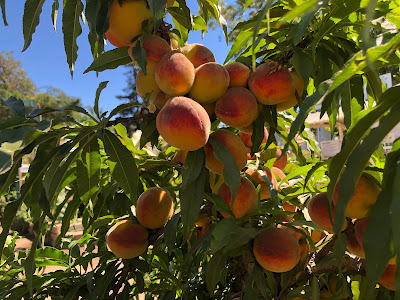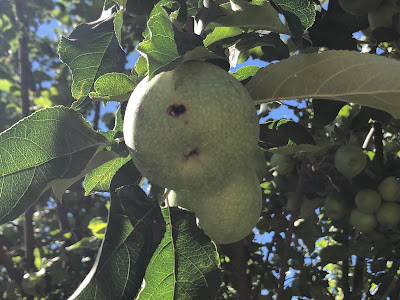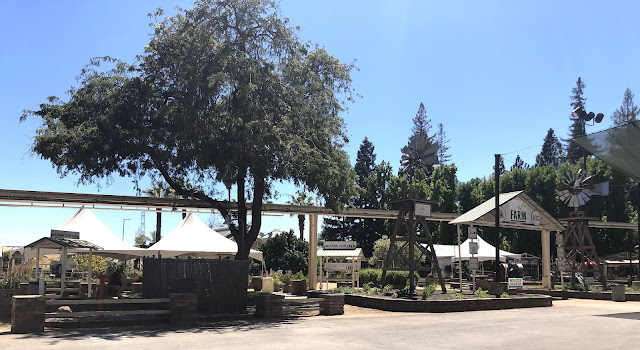
Heat and gardening questions and a sad orchard

|
|
This may look like a great crop, but this miniature
peach tree at the State Fair Farm should have been
thinned before the fruit started to ripen. Branches
are in danger of breaking. (Photos: Kathy Morrison)
|
Been to the State Fair yet this year? It has returned, but in a limited form, shaped by the three tumultuous years since the previous one. (What hasn't changed: Cal Expo is a scorching heat island in the late afternoon. More shade, please, everywhere.)
Back in the Farm area, where the UCCE Sacramento County master gardeners hang out in the open-air answer booth, we see the effects of the pandemic on gardening up close. Apparently because of staffing shortages, the vegetable areas were planted later than usual, so the plants aren't as big as they typically are at this time. No ripe tomatoes this week. The pepper plants aren't filled out. The herbs are not lush. The corn is not as high as an elephant's eye.
Oh, and the myriad weeds are tantalizing certain people (including me) who want to grab a trowel and start digging them out.

|
|
Looks like codling moth damage on this apple tree, which also
needs to be thinned.
|
Because, after all, the master gardeners are there to answer questions and even solve problems, if possible. And at the very least, lend a sympathetic ear.
Two shifts in the Farm booth revealed gardeners' concerns about:
-- Zucchini. It's typically so easy to grow, but it's a problem vegetable this year. Lack of pollination, attacks of whiteflies or squash bugs, and leaves turning yellow were among the question topics. (Probably too much water was the answer to that last one.) Here's a little more on growing squash .
-- Lack of production from vegetables. Beyond zucchini, this is a noticed problem with tomatoes, melons and cucumbers. Blame the heat wave (and lack of humidity) for this: The pollen dries out too fast for the flowers to be pollinated.
-- Vertebrate pests . Squirrels are the least of it, apparently. Rodents and birds are dining extensively on people's vegetables and fruit this summer. Blame the heat and lack of water sources for some of it, use barriers where possible, and try to distract them with bowls of water or seeds away from the growing food.
-- Insect pests. In addition to the whiteflies, the typical summer pests include spider mites, aphids and thrips -- sometimes all on the same plant. Quick hard sprays of water, delivered in the morning on the underside of the leaves, can help fight them. And the water will help also with humidity as it drips into the soil.
-- Planting schedules and plant choices. "Is it too late to plant ...?" got an immediate "yes" in many cases, followed by "it's too hot for baby plants!" Wait til fall, folks, when the heat should subside and planting will be easier on the plants and the gardeners. One foothills couple who asked about growing avocados were told gently that it's not an ideal tree for their region, but hey, citrus does great there! Ever thought of growing mandarins?

|
| Still plenty to see at the Farm at the State Fair, which runs through July 31. |
Comments
0 comments have been posted.Sacramento Digs Gardening to your inbox.
Food in My Back Yard Series
April 29: What's (already) wrong with my tomato plants?
April 22: Should you stock up on fertilizer? (Yes!)
April 15: Grow culinary herbs in containers
April 8: When to plant summer vegetables
April 1: Don't be fooled by these garden myths
March 25: Fertilizer tips: How to 'feed' your vegetables for healthy growth
March 18: Time to give vegetable seedlings some more space
March 11: Ways to win the fight against weeds
March 4: Potatoes from the garden
Feb. 25: Plant a fruit tree now -- for later
Feb. 18: How to squeeze more food into less space
Feb. 11: When to plant? Consider staggering your transplants
Feb. 4: Starting in seed starting
Sites We Like
Garden Checklist for week of May 4
Enjoy this spring weather – and get gardening!
* Plant, plant, plant! It’s prime planting season in the Sacramento area. Time to set out those tomato transplants along with peppers and eggplants. Pinch off any flowers on new transplants to make them concentrate on establishing roots instead of setting premature fruit.
* Direct-seed melons, cucumbers, summer squash, corn, radishes, pumpkins and annual herbs such as basil.
* Harvest cabbage, lettuce, peas and green onions.
* In the flower garden, direct-seed sunflowers, cosmos, salvia, zinnias, marigolds, celosia and asters. (You also can transplant seedlings for many of the same flowers.)
* Plant dahlia tubers. Other perennials to set out include verbena, coreopsis, coneflower and astilbe.
* Transplant petunias, marigolds and perennial flowers such as astilbe, columbine, coneflowers, coreopsis, dahlias, rudbeckia and verbena.
* Keep an eye out for slugs, snails, earwigs and aphids that want to dine on tender new growth.
* Feed summer bloomers with a balanced fertilizer.
* For continued bloom, cut off spent flowers on roses as well as other flowering plants.
* Add mulch to the garden to maintain moisture. Mulch also cuts down on weeds. But don’t let it mound around the stems or trunks of trees or shrubs. Leave about a 6-inch to 1-foot circle to avoid crown rot or other problems.